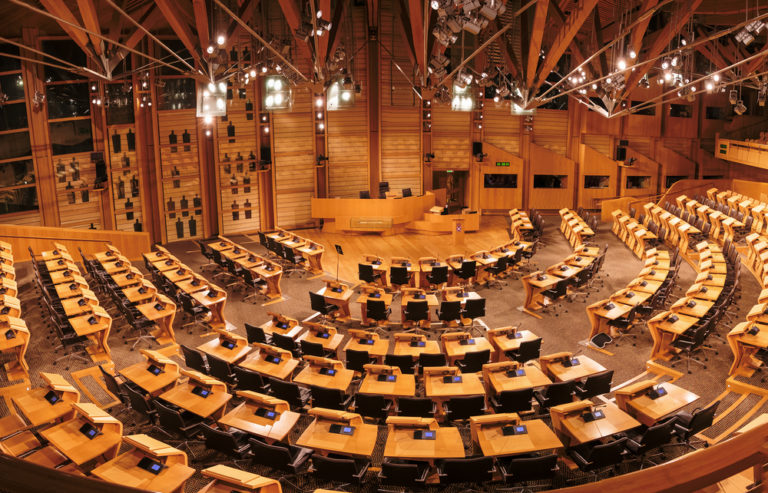Summer is officially over. The days are shorter, the nights are colder and Holyrood’s freshly rested MSPs have finally returned to the Holyrood debating chamber from their recess in sunnier climes, all in time to hear First Minister Nicola Sturgeon set out this year’s Programme for Government.
The 2018/2019 Programme for Government was expected to be overshadowed by opposition MSPs demanding answers on the recent revelations that Alex Salmond is taking the Scottish Government to court over its handling of current sexual harassment allegations made against him by two female staffers during his previous tenure as First Minister. In fact, the only reference from opposition leaders came from Labour’s Richard Leonard, who gave a stony-faced Nicola Sturgeon Labour’s full and unequivocal backing as the Scottish Government fights Mr. Salmond’s court case. The rest of the leaders decided to forgo the chance for political point scoring and got straight down to business in commenting on the Scottish Government’s political agenda for the next parliamentary year.
This year’s political agenda is set to be jam-packed, with 13 Bills carried over from the previous year and 12 new pieces of legislation promised on top of several new initiatives. Indeed, the number of Bills carried over raised a number of stern eyebrows in the opposition benches as Scottish Conservative Leader accused the Scottish Government of reducing last year’s ambitious programme to ‘spare change’. The Scottish Government no doubt has a lot of work to do to and it remains to be seen how successful they will be.
The headline announcement was the additional £250 million in funding for Mental Health Services, with the majority going to Child and Adolescent Mental Health Services (CAMHS). This will include:
- A pledge to provide dedicated mental health counsellors in schools
- First Aid Mental Health training for teachers
- An additional 250 school nurses
- Plans to fast track young people with the most serious mental illness to specialist services and reduce waiting times for others
This announcement followed new figures show waiting times for CAMHS are longer than ever, with a third of children and young people failing to receive CAMHS treatment within the government’s 18-week target.
Another key announcement was the pledge by the Scottish Government to introduce legislation which will allow EU citizens resident in Scotland to continue voting in Scottish elections after Brexit. This was underpinned by a commitment to lobby the UK Government to abolish settled status fees for EU citizens after Brexit. If this fails, the Scottish Government also committed to covering those fees for EU citizens working in the Scottish public services. This move would provide support to EU citizens working in the Scottish NHS, police service and other public bodies who might struggle to pay those fees and therefore lose the ability to live and work in the UK.
Taking a step away from Brexit, the Scottish Government continued last year’s focus on turning Scotland into a low-carbon economy, announcing it would introduce legislation for the Scottish National Investment Bank to enshrine and define criteria for businesses seeking support, including the need to be a low-carbon company. It also announced it will be banning plastic cotton buds, introducing a deposit return scheme for plastic bottles and funding the installation of hundreds of charging points to facilitate the switch to electric vehicles.
These steps were, however, not enough for Green Party leader Patrick Harvey, who said these measures lacked the ‘radical ambition’ needed to make Scotland carbon neutral and who promised to ‘step up pressure’ to help the Scottish Government ‘leave its comfort zone’.
All in all, this year’s Programme for Government painted a fairly positive picture of the next year in Parliament. It remains to be seen how far the Scottish Government will progress through the 12 new Bills announced today, and how much of the ‘additional funding’ touted today is new money. More details will be available after the Scottish Budget and relevant Ministers set out the respective details in full. In the meantime, a full list of the 12 Bills are outlined below.
Biometric Data Bill
This bill will create a code of practice covering the collection, retention, use and disposal of biometric data such as fingerprints, DNA and facial images.
Budget Bill
The annual Budget Bill will allow for Parliamentary approval of the Scottish Government’s spending for the parliamentary year.
Census (Amendment) Bill
This will allow National Records of Scotland to ask voluntary questions about an individual’s sexual orientation and transgender status/history in future censuses.
Consumer Protection Bill
The bill will create Consumer Scotland, which will investigate harmful practices and recommend best-practice for consumer rights.
Disclosure Bill
The bill will amend the Protection of Vulnerable Groups (Scotland) Act 2007 and Part V of the Police Act 1997 to modernise the disclosure system in such a way that protects vulnerable groups and victims of crime.
Electoral Franchise Bill
This will protect the right to vote for EU citizens resident in Scotland, in all Scottish elections.
Electoral Reform Bill
The bill will implement a range of electoral reforms, some of which will use the 2016 Scotland Act powers. This will include boundary changes as well as some technical changes.
Family Law Bill
The Bill will amend family law to make sure that the child’s best interests are at the centre of any contact and residence cases and further protect survivors of domestic abuse.
Female Genital Mutilation Bill
The bill will strengthen protection of women and girls from Female Genital Mutilation (FGM), including introducing protection orders for women and girls at risk and statutory guidance for institutions and organisations.
Non-Domestic Rates Bill
The bill will reform the business rates system in Scotland, including introducing a three-year valuation cycle. It will also include measures aimed to increase fairness by reforming tax reliefs and tackling avoidance measures.
Scottish National Investment Bank Bill
The bill will establish the Scottish National Investment Bank which will provide investment, help companies grow and support the government’s economic vision. It will also create defined National Missions to act as criteria for those seeking support.
South of Scotland Enterprise Agency Bill
This will create a new enterprise agency for the south of Scotland, which will be tasked with driving growth and supporting the local economy.





